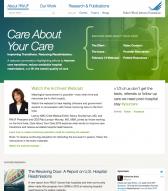This special edition of Spotlight explores AF4Q's endeavor to reduce preventable hospital readmissions and improve the quality of care delivered across care settings.
This special edition of Spotlight explores AF4Q's endeavor to reduce preventable hospital readmissions and improve the quality of care delivered across care settings.
When patients move across settings, for example, from a hospital to a nursing home, they are particularly vulnerable. Lapses in care, miscommunication of information between providers, and mixups with medication are all possible side effects of “handoffs” that are not well coordinated. Poor care coordination frequently results in unnessesary and costly hospital readmissions. The United States health care system has long struggled with this issue; ultimately it costs the system $17 billion per year.
Recognizing the importance of this issue, the Robert Wood Johnson Foundation has elevated the national conversation in the .jpg) month of February through its Care About Your Care campaign. The campaign focuses on improving care transitions to reduce avoidable hospital readmissions and on how nurses, care coordinators, doctors, consumers, caregivers, and patients can work together to accomplish this.
month of February through its Care About Your Care campaign. The campaign focuses on improving care transitions to reduce avoidable hospital readmissions and on how nurses, care coordinators, doctors, consumers, caregivers, and patients can work together to accomplish this.
AF4Q Alliances have done significant work to improve the quality of care in hospital settings and are expanding these efforts to improve care across settings.












